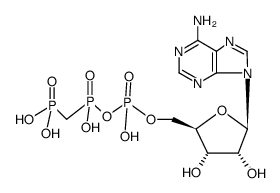AMP-PCP
Modify Date: 2025-08-25 14:47:05

AMP-PCP structure
|
Common Name | AMP-PCP | ||
|---|---|---|---|---|
| CAS Number | 3469-78-1 | Molecular Weight | 505.20800 | |
| Density | N/A | Boiling Point | N/A | |
| Molecular Formula | C11H18N5O12P3 | Melting Point | N/A | |
| MSDS | N/A | Flash Point | N/A | |
Use of AMP-PCPAMP-PCP is an ATP analogue and can bind to Hsp90 N-terminal domain with a Kd value of 3.8 μM. AMP-PCP binding favors the formation of the active homodimer of Hsp90[1]. |
| Name | amppcp |
|---|---|
| Synonym | More Synonyms |
| Description | AMP-PCP is an ATP analogue and can bind to Hsp90 N-terminal domain with a Kd value of 3.8 μM. AMP-PCP binding favors the formation of the active homodimer of Hsp90[1]. |
|---|---|
| Related Catalog | |
| Target |
HSP90:3.8 μM (Kd) |
| In Vitro | AMP-PCP binding favors the formation of the active homodimer of Hsp90 by enhancing the slow-motion featured conformational exchanges of those residues (A117-A141) within the lid segment (A111-G135) and around region. In total, 170 non-proline residues are identified for the triple-labeled Hsp90 bound with AMP-PCP[1]. |
| References |
| Molecular Formula | C11H18N5O12P3 |
|---|---|
| Molecular Weight | 505.20800 |
| Exact Mass | 505.01600 |
| PSA | 299.33000 |
| InChIKey | UFZTZBNSLXELAL-IOSLPCCCSA-N |
| SMILES | Nc1ncnc2c1ncn2C1OC(COP(=O)(O)OP(=O)(O)CP(=O)(O)O)C(O)C1O |
| β,γ-methylene ATP |
| beta,gamma-methylene-ATP |
| AMP-PCP |
| β,γ-methylene-ATP |
| β,γ-meATP |
| adenosine-5’-[(β,γ)-methyleno]triphosphate |